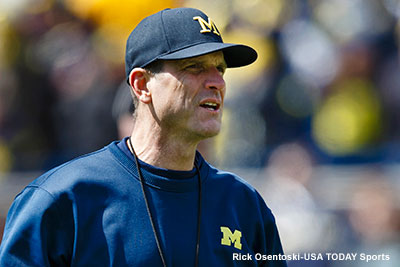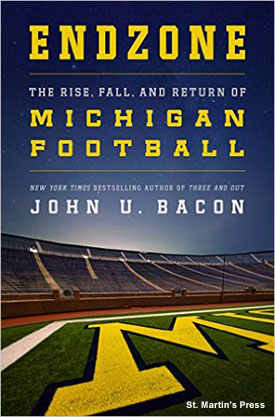Years before he began his triumphant Summer of Jim revival tour in which he preached his shirtless brand of coaching gospel, Jim Harbaugh was staring at a large chasm, separated from the alma mater that meant everything to him.
In the years before he was deemed Jim Harbaugh the Michigan Football Messiah, he had, at least around Ann Arbor, become Jim Harbaugh the Outcast, the former poster boy quarterback that few around the picturesque Midwestern college town wanted much -- if anything -- to do with.
The coach, molded in legendary Michigan general Bo Schembechler's image, had been deemed an "elitist" by former Wolverines football coach Lloyd Carr. The characterization came after Harbaugh -- then in his first year at Stanford's helm -- called for Michigan to hold itself to a higher academic standard rather than being known as a "good school" where the athletic department "has a way to get borderline guys in."
The comments, made in 2007, were seen initially as harmless by both those who know Harbaugh best and Michigan's athletic director at the time, Bill Martin. But around Ann Arbor, where loyalties run thick, Harbaugh -- unbeknownst to him -- was facing excommunication.
After a media firestorm during which he not only repeated his claims but also expounded on them, a rift between Harbaugh and his beloved school back in Ann Arbor began to grow.
How the relationship was healed and eventually led to a football marriage between Harbaugh and Michigan is chronicled in John U. Bacon's latest book, "EndZone: The Rise, Fall, and Return of Michigan Football," which will be released Sept. 1. (Click here to read exclusive excerpt.
The book focuses largely on the devastation and eroding of Michigan's program under the watch of former athletic director Dave Brandon. But running through its 83 chapters is the detailed backstory of how Michigan landed the biggest fish in the coaching sea last winter, pulling off what was seen by many as the impossible task of luring Harbaugh from the NFL and back to the college program he had long dreamed of leading.
Bacon obtained a simple but significant 2009 email exchange between Harbaugh and Martin that in all likelihood provided a back door entry into what turned out to be Harbaugh's grand front-door return to Michigan almost five years later.
Without the fence-mending mission, says longtime Harbaugh friend, advisor and confidant Todd Anson, the deal to bring Harbaugh home to Ann Arbor -- and the healing between the two sides that needed to happen -- likely doesn't happen.
The ideologies spelled out by San Francisco Examiner columnist Glenn Dickey in 2007, stating that college football needed Stanford to serve as a shining academic example to its fellow NCAA brethren was nothing new to Anson. A night before his comments ran in the paper, Harbaugh had preached the same message almost verbatim on Anson's San Diego patio during a casual barbecue.
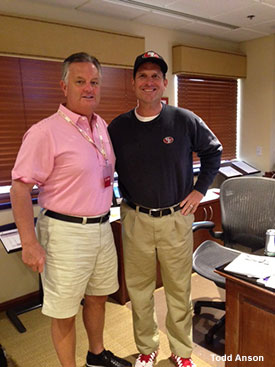
Harbaugh arrived at Michigan as a freshman in 1982 and planned to major in history only to be told that he needed to take on a less rigorous academic load. Now, all these years later, he had overseen the recruiting of Andrew Luck, landing the prize recruit largely because the quarterback could major in engineering at Stanford rather than being forced to follow the same path Harbaugh had years earlier.
So when Harbaugh asserted that Stanford had set itself apart from other universities -- including Michigan -- Anson, a graduate of Michigan's law school, took no offense.
In his confident language of Harbaughese, the coach was calling for schools nationwide to step up their academic game.
"To me, the story was about empowerment and about the race to the top academically," Anson told ThePostGame in a phone interview. "It wasn't a story about some scandalous notion that Michigan is weak in any way academically, which of course, it's not."
But Harbaugh, first in his comments to Dickey and then in a conversation with then Ann Arbor News columnist Jim Carty, quickly became Public Enemy No. 1 in Ann Arbor.
"I don't think (Michigan) should cut corners that dramatically for football and basketball players," Harbaugh told Carty in a column Bacon references in the book. "I love the university. I got a tremendous education there. I think it should be held to a higher standard. I think it should hold itself to a higher standard."
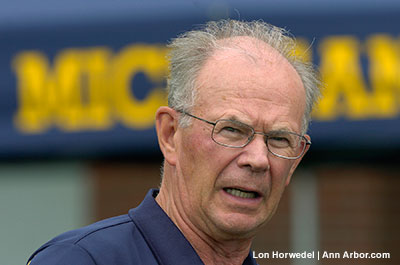
Like Anson, Martin, Michigan's AD from 2000 to 2010, wasn't offended by Harbaugh's assertion. Martin, who nearly a year after Harbaugh's comments hired Rich Rodriguez to take over Michigan's program, didn't anticipate the public backlash that made Harbaugh out to essentially be a traitor.
Martin told ThePostGame that at the time, he felt if Harbaugh had thought about his comments, they likely wouldn't have been made, characterizing the then-Stanford coach's feelings as "candid and off-the-cuff."
But when Harbaugh further outlined his opinion to Carty in the Ann Arbor News, the controversy around town and within the Michigan community grew. It prompted Carr, then in his final season at Michigan, to refer to Harbaugh as "arrogant" and former running back Mike Hart, famous for referring to rival Michigan State as "Little Brother," to tell reporters at the Big Ten's Media Day that Harbaugh wasn't a Michigan Man and that he wished Harbaugh had never played at Michigan. According to Bacon, neither Carr nor Hart appeared to reach out to Harbaugh before making their comments.
What had started out as a call for Michigan to take more accountability in its approach to athletics and academics had become an explosive topic that turned much of the school's fan base against Harbaugh.
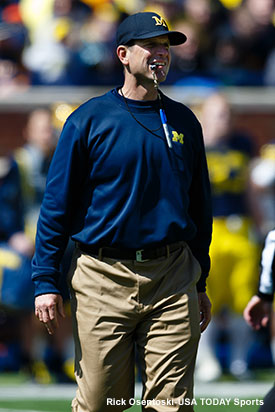
And in Ann Arbor, Martin heard from some of Harbaugh's critics who were "madder than heck about it." That became as part of what Martin calls a "visceral human reaction" and he knew it meant trouble.
"Absolutely, it bothered me," Martin says in a phone interview. "It was (like), ‘We don't need this -- this shouldn't be here.' But it happened and you do what can to heal it and move on.
"Yes, it very much bothered me. It detracted from the focus of the team at that time, the legacy of the program and nobody needs that."
Anson says he and Harbaugh never discussed the coach's crumbling relationship with his alma mater. But he could tell that a coach famous for keeping distractions at a stiff-arm's length and being unfazed by public option, had clearly taken a hit -- even if publicly, he acted like nothing was amiss.
"He's got the thickest, toughest skin of anybody I've encountered in my life," Anson says. "So if he knows he's right about something, it's going to affect him less than if he is -- or might be -- wrong about it."
As Michigan's reputation as a national football power continued to take a pounding under Rodriguez and eventually under Brady Hoke, Harbaugh was turning Stanford into a major player.
He was doing so with his Cardinal players adhering to Stanford's strict academic standards while running his program with the belief that a smarter team is a better team all other factors being equal.
As Harbaugh was becoming a top-notch coach that would eventually lead to his graduation to the NFL and the San Francisco 49ers, things were still not right with Michigan.
While Harbaugh had moved on past his comments two years earlier, Michigan clearly had not.
Instead of viewing Harbaugh's comments as constructive criticism, Michigan had dug its heels in, holding firm to the belief that nothing needed to change. By doing so, it was creating distance between itself and Harbaugh.
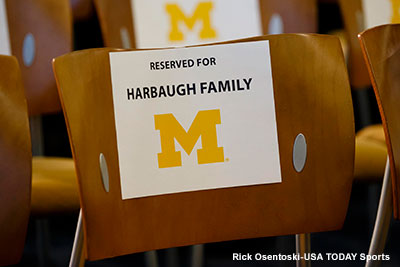
"Jim was never estranged to Michigan -- he has always unqualifiedly loved Michigan," Anson says. "Michigan was estranged from Jim, and that's what I never could understand."
Despite harboring no ill feelings toward Michigan, Harbaugh used the occasion of Martin's retirement as athletic director to begin to reconstruct a bridge between himself and the university, and ultimately the Wolverines' legion of fans.
Anson suggested to Harbaugh that perhaps, by opening lines of communication with Michigan, a damaged relationship could somehow be put back together.
The rebuilding began with a simple email obtained by Bacon and chronicled in "EndZone."
Mr. Martin,
Congratulations on your retirement announcement. You've done a great job in the last ten years. Don't let the bastards get you down.
Go Blue/Go Stanford
-Jim Harbaugh
Martin, according to Bacon, replied the same day. In it, Martin accepts the olive branch offered by Harbaugh and writes,
It's time to have you back on campus. You're a big part of Michigan's football history. All the "drama" of a couple of years ago is over. I would be honored to host you anytime, even if we can't work out a game (between Michigan and Stanford).
Regards, Bill.
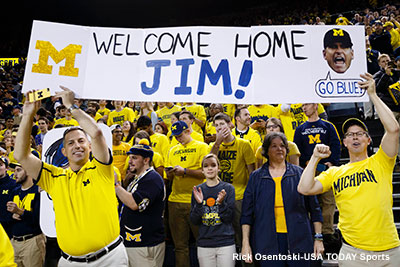
Anson, who was just leaving Harbaugh's Stanford office as the emails were sent between Palo Alto and Ann Arbor, could tell that Harbaugh took great satisfaction that the severed ties between himself and Michigan were, at the very least, on the road to recovery.
"The healing feels good, doesn't it?" Harbaugh told Anson.
Martin didn't recall the email exchange until presented with copies by Bacon during the reporting phase of the book. But he now looks upon the fence mending as something that needed to take place to restore the relationship between the university and of one of its favorite sons.
"I absolutely wanted (to fix the relationship) because of what he's done for Michigan, what he means to Michigan as part of our overall football legacy," Martin tells ThePostGame. "So yeah, I was very aggressive and I meant every word I put in those emails."
The exchange, which includes two other emails included in "EndZone," is -- according to the author -- a critical moment in restore the relationship that led to Harbaugh's hiring.
"I think the email between Jim Harbaugh and Bill Martin is a quiet, private, relatively small but crucial first step," Bacon says in a phone interview. "It showed both men at their best -- Jim humble enough to reach out and assert his loyalty to Michigan, which has never waned and Bill Martin being a big enough man to accept and return an olive branch.
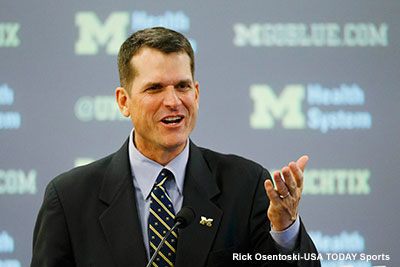
"That is how Michigan Men are supposed to handle themselves."
As Harbaugh prepares for his first season with the Wolverines next week at Utah, he has restored the rock star -- almost cult-like -- status he had as an upperclassmen in 1986 when he became the Big Ten's top player.
Gone is the animosity that came with his comments eight years ago, having been replaced by the belief Harbaugh is the man to bring Michigan football back to greatness.
In part, Anson believes that Harbaugh's commitment to holding his players accountable -- not only on the field but academically -- is part of what made the former quarterback such a big target for Michigan after Hoke was fired after last season's 5-7 finish.
But for Martin, who was replaced by Brandon (who resigned following his own firestorm of controversy in 2014), understands that for all of the hero worship, Harbaugh's road to rebuilding Michigan football won't be easy.
"The family is together again," Martin says. "The Big House is sold out, people are excited, but I think they understand it's going to be two years probably before we're probably a very strong national contender."
Only time will tell. But if Harbaugh -- now fully again embraced by a community that once shunned him -- has anything to do with it, the return of Michigan football will be one its proud and loyal fan base won't soon forget.
-- Email Jeff Arnold at jeff.arnold@thepostgame.com and follow him on Twitter @JeffArnold_.

